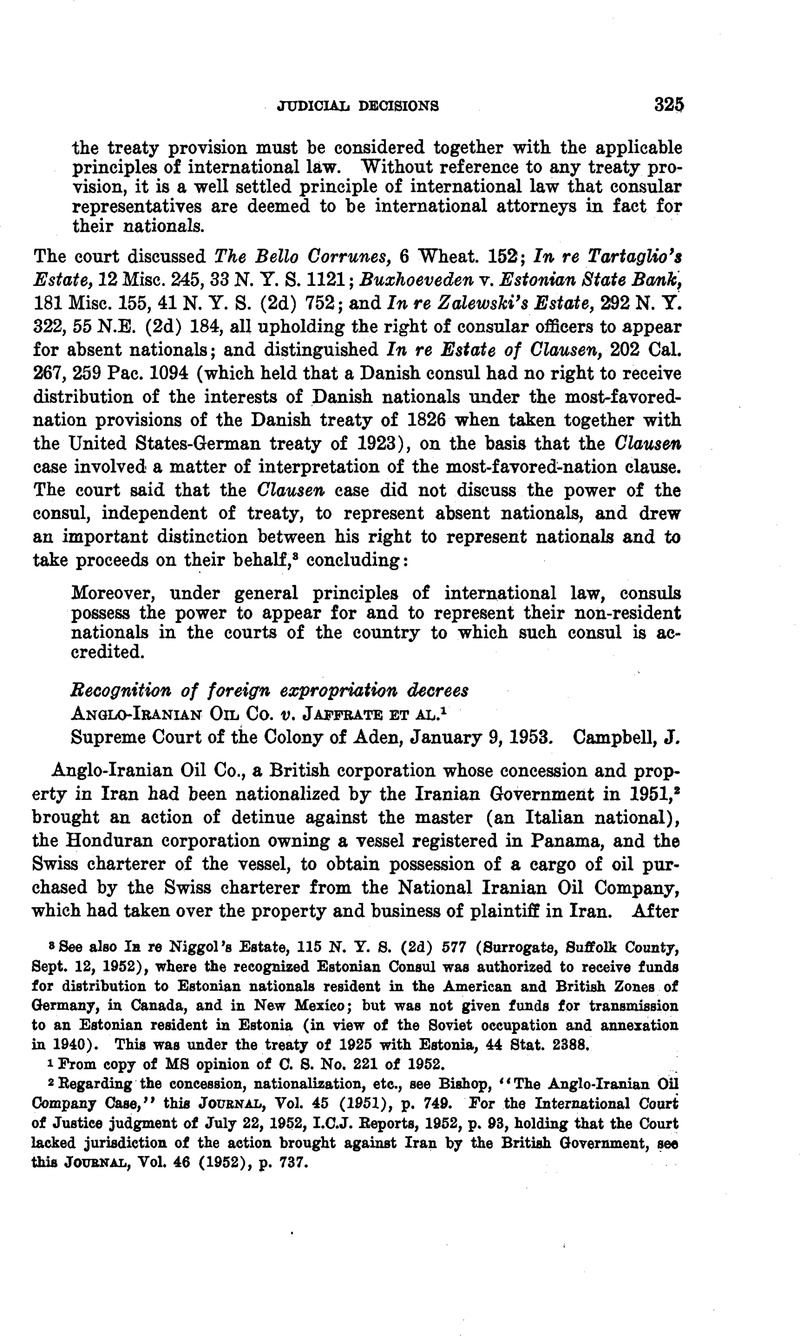Article contents
Anglo-Iranian Oil co. v. Jaffrate et al.
Published online by Cambridge University Press: 20 April 2017
Abstract

- Type
- Judicial Decisions
- Information
- Copyright
- Copyright © American Society of International Law 1953
References
1 From copy of MS opinion of C. S. No. 221 of 1952.
2 Regarding the concession, nationalization, etc., see Bishop, “The Anglo-Iranian Oil Company Case,” this Journal, Vol. 45 (1951), p. 749. For the International Court of Justice judgment of July 22, 1952, I.C.J. Reports, 1952, p. 93, holding that the Court lacked jurisdiction of the action brought against Iran by the British Government, see this Journal, Vol. 46 (1952), p. 737.
3 The alleged coercion consisted in orders to the master from the owners of the vessel, threatening legal proceedings against him if he refused to carry out their orders, and the fact that an R.A.F. airplane circled overhead and in consequence the master was afraid of possible bombardment. On the latter point the court said: “No reasonable man could think it likely that H. M. Government in the year 1952 would try to resolve a commercial dispute by what would be little short of an act of war.”
4 See footnote 2, supra, and sources referred to there. The text of the concession may be found in League of Nations Official Journal, 1933, p. 1653.
5 The court discussed Wolff v. Oxholm, 6 M. & S. 1177 (1817); Kaufman v. Gerson, [1904] 1 K.B. 591; Be Fried. Krupp A. G., [1947] 2 Ch. 188, from the British courts; Société Potosas Ibericas v. Nathan Bloch, Annual Digest, 1938–40, p. 150, and U.S.S.R. v. Socieéteé Ropit, ibid., 1927–28, p. 67, from the French courts; Siuta v. Guzkowski, ibid. 1919–22, p. 480, from Poland; certain German and Italian cases; the Norwegian Ships Arbitration of 1922, J. B. Scott, Hague Court Reports (2nd Ser.), p. 39; the De Sabla Case before the U.S.-Panamanian Claims Commission, Hunt’s Report, p. 379, and Annual Digest, 1933–34, p. 241; and the 1938 correspondence between Secretary Hull and the Mexican Government concerning expropriation of oil and agrarian properties in Mexico. With respect to the arguments presented by Secretary Hull, the court said: “… it is an opinion set out when arguing a brief and as such I think it cannot have the weight which should be given to a judicial opinion. It has not got that salutary check upon the writer of the overhanging shadow of a court of appeal. How I think the plaintiffs are entitled to invoke the dispute in their aid is by reason of the fact that throughout the argument the Mexican Government does not appear to have denied the main premise of their adversary’s argument … they do not deny the principle of compensation.”
6 For the Order of July 5, 1951, by the International Court of Justice, in the Anglo-Iranian Oil Co. Case, Request for the Indication of Interim Measures of Protection, see I.C.J. Reports, 1951, p. 89, this Journal, Vol. 45 (1951), p. 789.
- 1
- Cited by


